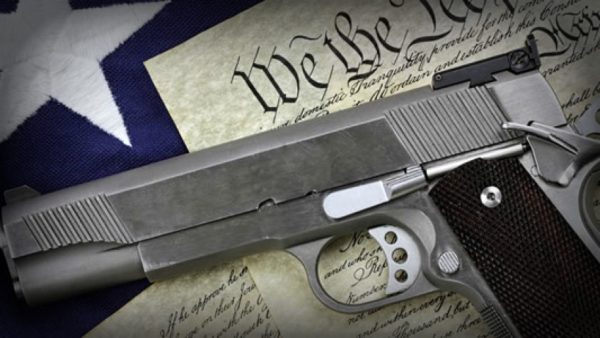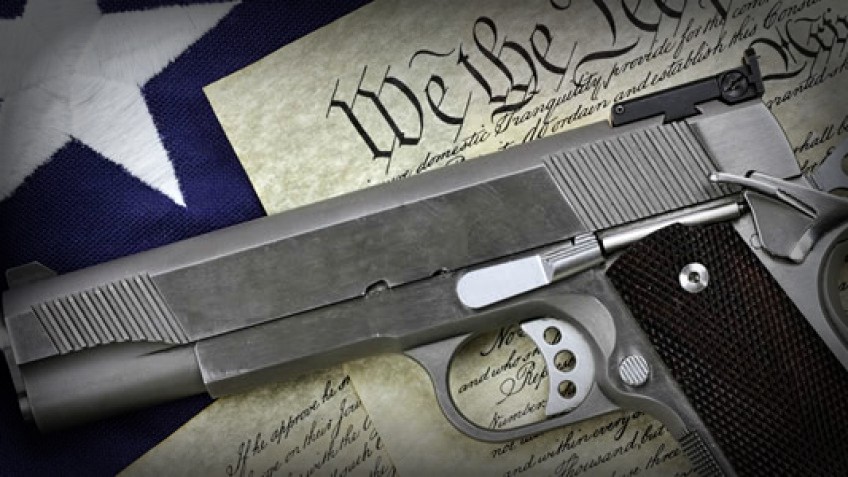
Image source: The Federalist Society
Parkland, Sutherland Springs, Las Vegas, Pulse, Charleston, San Bernardino. In each of these mass shooting cases, the perpetrator(s) of the crimes obtained their guns and ammunition legally and used them to kill and injure scores of people in public places ranging from schools and churches to offices and nightclubs. While popular debate continues to foment over which mass shooting/killing incident should be called terrorism and how best to prevent mass shootings, we often overlook the major national security vulnerability created by our gun laws.
In a 2017 issue of Rumiyah, the online propaganda magazine of the Islamic State, an article encouraging US-based ISIS sympathizers to take advantage of America’s loose gun laws to carry out their acts of terror appeared. “The acquisition of firearms can be very simple depending on one’s geographical location…In most U.S. states, anything from a single-shot shotgun all the way up to a semi-automatic AR-15 rifle can be purchased at showrooms or through online sales — by way of private dealers — with no background checks, and without requiring either an ID or a gun license.” [1] Because the United States allows for freedom of movement between states, loose gun laws in some states allow gun traffickers to take guns into urban areas in states with strict gun control laws.
Trafficking between cities on the East Coast and gun-friendly states like Virginia, Pennsylvania, and Georgia is so pervasive that I-95 is often referred to as the Iron Pipeline. [2] And while it is true that guns trafficked on the Iron Pipeline overwhelmingly go to organized crime rather than mass shootings or terrorist incidents, [3] the ease of purchase and movement of guns is what is at issue here. If all one needs to obtain the guns to carry out a terrorist attack is a clean background check to buy at a licensed gun dealer or the ability to make a purchase at a gun show, then the young adult radicalizing on the internet to white supremacist or ISIS propaganda only has their own ambition to stop them.
This of course, brings us to our vendetta: Rights v. Security. What do we do when something deemed a right conflicts with the ability of the people to leave peacefully? Is several dozen lives a year in mass shootings and terrorism an acceptable price for the right to own a gun? Or should we reexamine the right to own guns in light of the risk to national security and public safety?
Ben Franklin is quoted as saying that “those who would sacrifice liberty for security deserve neither” and while historians argue that the context Franklin was speaking of wasn’t related to rights issues, [4] the quote still has cachet among civil libertarians. But to that end, many on the pro-gun side would argue that terrorists abusing our rights is even more reason to cling to them more. Additionally, many would argue that surrendering gun rights in the face of terrorism could leave law abiding citizens defenseless in an active shooting (“a good guy with a gun”) or in the event of government tyranny. Bolstering their argument is current Supreme Court precedent laid down in the Heller (2008) and McDonald (2010) decisions saying that the 2nd Amendment creates an individual right to own guns.
On the other side of the issue are gun control advocates who argue that the genuine risk to public safety and national security overrides the right to own guns and thus certain regulations on gun ownership must be put in place. Bolstering their position is data on gun violence showing that states with more guns experience more gun violence than states with stricter gun control laws. [5] On top of that are the exhortations by terror groups and others to use lax gun laws to obtain weapons to carry out attacks; in fact, in the Rumiyah article I quoted above, the same issue displays the methods of the Pulse Nightclub shooter as a model for other would-be terrorists. [1]
While both sides will continue to debate the issue, we as a society have a decision to make on whether or not we want to continue the free flow of guns in our society, and ultimately the option you choose comes down to what you as an individual prioritize:
- Hug the 2nd amendment: If you prioritize gun rights then the status quo is fine, or could possibly need more deregulation. While it may be the case that American gun laws are being advertised by ISIS as something to exploit, that is no reason to turn our back on the Constitution. More people should be educated in proper gun use so that those would-be mass shooters are more hesitant to carry out their attacks.
- Repeal the 2nd amendment: Those who view the danger posed to national security and public safety by guns would probably be best served by a repeal of the 2nd amendment. The implementation of a gun ban would be hard fought in the legislature, but once implemented would close an avenue for would-be terrorists to easily and discreetly obtain guns.
- Compromise: You may be uncomfortable with the current status quo, but repealing the 2nd amendment is the ultimate uphill climb, and as such you’d prefer a gun control policy that while possibly not as effective as a European or Japanese-style gun ban, will do work to reduce the national security and public safety vulnerability posed by guns.
While my personal sympathies lie with a repeal of the 2nd amendment, as an observer of politics I am aware that such a move is politically impossible at the moment. Even the speakers at the March for our Lives rally in Washington and other gun-control groups aren’t pushing for that. However a compromise position that balances the vulnerabilities created by the 2nd amendment and the real national security risk posed by guns could contain many components:
- Mandatory gun registry – to ensure that guns aren’t being trafficked illegally there should be a registry similar to vehicles.
- Mandatory gun insurance – in creating an insurance system with underwriting for gun purchases, we will have more assurances that the people cleared by their insurance companies have passed mental and other background checks such that an insurance company would be willing to pay for any damages their gun might cause.
- No Fly No Buy – an actual bill in Congress that would prohibit those on the Terror No Fly List from buying guns legally.
- Universal Background Checks – another bill in Congress that would effectively close the gun show loophole by mandating a background check for every gun purchase whether from a licensed gun dealer or not.
Take Action:
Whichever way you prioritize guns, this is one issue for which advocates on both sides of the issue have ample opportunities to voice their opinions and demand action. For my pro-gun readers, groups like the National Rifle Association and Gun Owners of America advocate against any new gun restrictions and for loosening regulations on gun manufacture and sale. For those in favor of gun control, groups like Moms Demand Action and Everytown for Gun Safety have been pushing for gun control laws, as has Never Again MSD, the student movement led by the survivors of the Marjory Stoneman Douglas Shooting in Parkland, Florida. For a more direct action, you can also call your congressperson and senators and voice your opinion on the No Fly No Buy and Universal Background Check bills.
Links:
Moms Demand Action – https://momsdemandaction.org/
Everytown For Gun Safety – https://everytown.org/
Never Again MSD – https://www.facebook.com/NeverAgainMSD/
National Rifle Association – https://home.nra.org/
Gun Owners of America – https://gunowners.org/
Capitol Switchboard – (202) 224-3121
References:
- Hawkins, D. (2017, May 05). Islamic State magazine steers followers to U.S. gun shows for ‘easy’ access to weapons. Retrieved March 28, 2018, from https://www.washingtonpost.com/news/morning-mix/wp/2017/05/05/islamic-state-magazine-steers-jihadists-to-u-s-gun-shows-for-easy-access-to-weapons/?utm_term=.7f2e305134fc
- Smith, A. (2016, January 19). How the Iron Pipeline funnels guns into cities with tough gun laws. Retrieved March 28, 2018, from http://money.cnn.com/2016/01/19/news/iron-pipeline-gun-control/index.html
- Aisch, G., & Keller, J. (2015, November 13). How Gun Traffickers Get Around State Gun Laws. Retrieved March 28, 2018, from https://www.nytimes.com/interactive/2015/11/12/us/gun-traffickers-smuggling-state-gun-laws.html
- Siegel, R. (2015, March 02). Ben Franklin’s Famous ‘Liberty, Safety’ Quote Lost Its Context In 21st Century. Retrieved March 28, 2018, from https://www.npr.org/2015/03/02/390245038/ben-franklins-famous-liberty-safety-quote-lost-its-context-in-21st-century
- Lopez, G. (2017, October 04). The research is clear: Gun control saves lives. Retrieved March 28, 2018, from https://www.vox.com/policy-and-politics/2017/10/4/16418754/gun-control-washington-post




